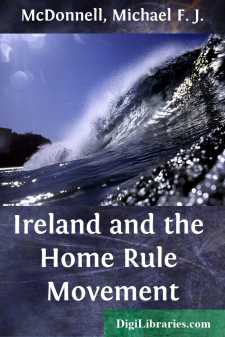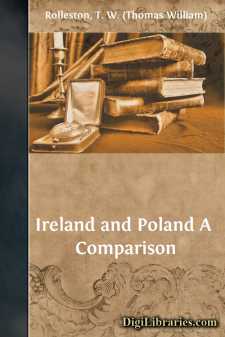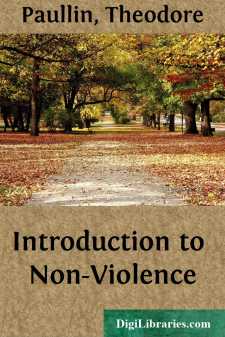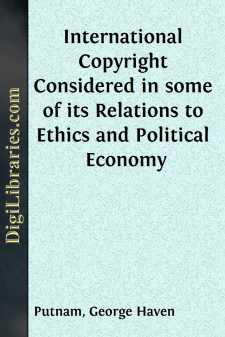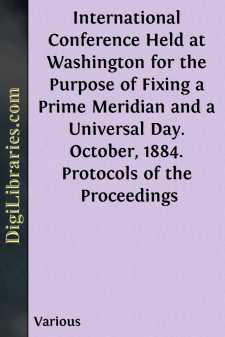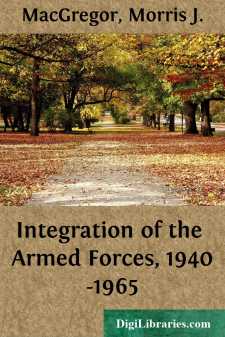Non-Classifiable
- Non-Classifiable 1768
Non-Classifiable Books
Sort by:
The growing interest in the popular tales of Europe has led me to believe that a selection from those of Italy would be entertaining to the general reader, and valuable to the student of comparative folk-lore. The stories which, with but few exceptions, are here presented for the first time to the English reader, have been translated from recent Italian collections, and are given exactly as they were...
more...
TO JOHN RUSKIN. My dear Mr. Ruskin,—You have given me very great pleasure by allowing me to inscribe this book to you, and for two reasons; for I have two kinds of acknowledgment that I wish to make to you—first, that of an intellectual debtor to a public teacher; secondly, that of a private friend to the kindest of private friends. The tribute I have to offer you is, it is true, a small one; and...
more...
INTRODUCTION A decree of Pope Adrian IV., the only Englishman who has sat in the chair of St. Peter, in virtue of the professed jurisdiction of the Papacy over all islands, by a strange irony, sanctioned the invasion of Ireland by Strongbow in the reign of Henry II. Three years ago I stood in the crypt of St. Peter's in Rome, and the Englishman who was with me expatiated on the appropriate nature...
more...
IRELAND AND POLAND The United Kingdom is composed of four distinct nationalities. Each of these has retained its own distinct character, its own national history, its own patriotism and self-respect. Their affairs, great and small, general or local, are administered by one Parliament in which each is fully represented. A large majority of the Irish people have, however, asked that in addition to some...
more...
by:
Theodore Paullin
I. INTRODUCTION: ON TERMS "In the storm we found each other." "In the storm we clung together." These words are found in the opening paragraphs of "Hey! Yellowbacks!" The War Diary of a Conscientious Objector. Ernest L Meyer uses them to describe the psychological process by which a handful of men—a few professors and a lone student—at the University of Wisconsin grew into...
more...
CHAPTER I. MAN, COMPOSED ALMOST WHOLLY OF WATER, IS CONSTIPATED. WHY? Naturally the mind of man was first educated to observe external objects and forces in their effects upon himself, and the external still continues to engross his attention as if he were a child in a kindergarten. Fascinated by the Without, he ignores the Within. But, marvel of marvels, Disease (which when looked at with discerning...
more...
IintroductoryIn dealing with the problem of the introduction of an international language, we are met on the threshold by two main questions: 1. The question of principle. 2. The question of practice. By the question of principle is meant, Is it desirable to have a universal language? do we wish for one? in short, is there a demand? The question of practice includes the inquiries, Is such a language...
more...
INTERNATIONAL COPYRIGHT. A paper read January 29th, 1878, before the New York Free-Trade Club. The questions relating to copyright belong naturally to the sphere of political economy. They have to do with the laws governing production, and with the principles regulating supply and demand; and they are directly dependent upon a due determining of the proper functions of legislation, and of the relations...
more...
by:
Various
I. SESSION OF OCTOBER 1, 1884. The Delegates to the International Meridian Conference, who assembled in Washington upon invitation addressed by the Government of the United States to all nations holding diplomatic relations with it, "for the purpose of fixing upon a meridian proper to be employed as a common zero of longitude and standard of time-reckoning throughout the globe," held their...
more...
Foreword The integration of the armed forces was a momentous event in our military and national history; it represented a milestone in the development of the armed forces and the fulfillment of the democratic ideal. The existence of integrated rather than segregated armed forces is an important factor in our military establishment today. The experiences in World War II and the postwar pressures...
more...




